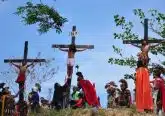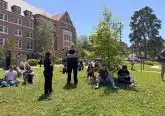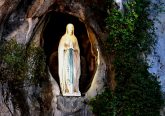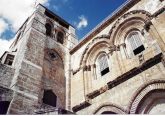South Carolina Catholic makes sacred art from simplest of office supplies

IMAGE: CNS photo/Christina Lee Knauss, The Catholic Miscellany
By Christina Lee Knauss
ST. MATTHEWS, S.C. (CNS) — For years, Matthew Quay picked up paper clips from desks and absent-mindedly straightened them while listening to discussions or presentations at work.
He also carried some in his pockets to straighten during Mass at Holy Trinity Church in Orangeburg.
It was simply something to do with his hands to help him stay focused, he said.
He never figured that simple action would eventually turn into works of art that help persecuted Christians overseas.
Last fall, Quay started to experiment with twisting the straightened clips into various shapes. He made a cross. With a few more twists, he formed the corpus of Christ.
Within days, he was making beautiful crucifixes out of paper clips, sacred art formed from the simplest of office supplies.
Since then, Quay’s creations have been displayed at the Orangeburg County Fine Arts Center. Sales of the artwork have raised thousands of dollars to help persecuted and displaced Christians in the Middle East.
Around the same time he made his first paper-clip crucifix, Quay was feeling helpless and sad about the plight of families fleeing Syria and other war-torn parts of the Mideast.
“In September of 2015, I saw all those images of the refugees, especially that little boy who washed up on the shore in Turkey,” he told The Catholic Miscellany, newspaper of the Diocese of Charleston. “It really bothered me because I felt we were so comfortable over here and it seemed like there was nothing we could do. I never thought my feelings about the refugees and my art would come together.”
In December, his mother, Deni Quay, asked him to sell his work at Holy Trinity’s annual Christmas bazaar. Quay, who belongs to Knights of Columbus Council 6891, had recently learned of the Knights’ nationwide efforts to raise money for Christian refugees in the Middle East.
Finally, he said, he saw a way for his art to help the people who haunted his thoughts.
By December, his crucifixes had evolved from simple crosses in one or two colors to larger, more elaborate ones made with clips of varying sizes in many hues. In two days, he made more than $1,400 for the refugee effort.
That success prompted Quay to devote even more time to his creations, to expand the complexity and variety of detail, size and color.
He purchased paper clips from office supply stores and online sources. People started giving him extras they had around the house. He especially treasures a donation of hundreds of vintage ones that came from the home of a former schoolteacher. Older clips, he said, come in darker, more burnished hues of silver and gold which add a special look to the crucifixes.
He found some about 4 inches long in a sale bin at a store. Those large clips ended up being ideal for his big crucifixes, which can be up to 17 inches long and use more than 200 clips. These large pieces take about 18 hours of work to complete, while smaller ones take about four hours.
Quay said his inspiration for the colors comes from the seasonal vestments worn by Father Wilbroad Mwape, administrator at Holy Trinity, where he’s a member.
He also has made crucifixes on request: a gold and white one in the shape of an anchor for a woman who lost a brother in a boating accident, dark blue for a police officer, another with a medal of St. Peregrine for a woman whose family member has cancer. For Christmas, he incorporated clips in Southwestern hues of turquoise and red for his father-in-law, who lives in Texas and loves Native American culture.
When he’s working, Quay said he spends a lot of time in “meditative thought” but doesn’t have a specific prayer routine. Sometimes he prays “lots of Hail Marys,” he said, or for various prayer intentions.
He is most aware that the crucifixes are God’s work through him, especially when he considers what their sales have accomplished in only a few months.
A series of simpler figures of Christ affixed to wooden crosses raised more than $950 when his council sold them after Masses. That, combined with money raised from the bazaar and the exhibit, means more than $5,500 will be donated to help refugees.
All because of paper clips.
“The reaction has been overwhelming,” Quay said. “This whole process has really been a series of little discoveries. It’s taking a very insignificant thing and making it into something beautiful.”
– – –
Knauss is on the staff of The Catholic Miscellany, newspaper of the Diocese of Charleston.
– – –
Copyright © 2016 Catholic News Service/U.S. Conference of Catholic Bishops. www.catholicnews.com. All rights reserved. Republishing or redistributing of CNS content, including by framing or similar means without prior permission, is prohibited. You may link to stories on our public site. This copy is for your personal, non-commercial use only. To request permission for republishing or redistributing of CNS content, please contact permissions at [email protected].













